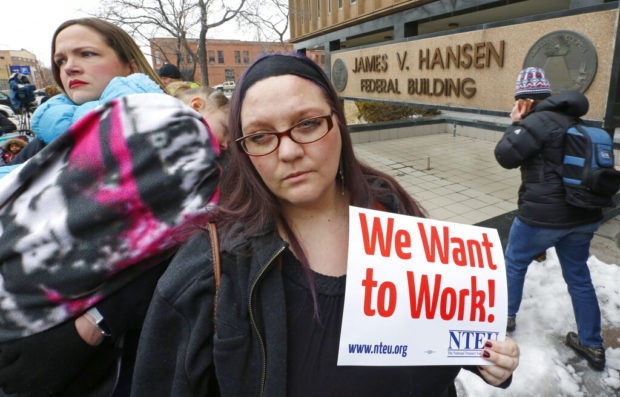US federal workers seek loans, second jobs as shutdown lingers

IRS worker Christine Helquist joins a federal workers protest rally outside the Federal Building on Jan., 10, 2019, in Ogden, Utah. AP
OGDEN, Utah — Rachael Weatherly is a senior adviser for the Federal Emergency Management Agency, but she’s considering trying to get a job at a grocery store.
Weatherly is among the 800,000 federal employees who aren’t getting paychecks for the first time Friday because of the lingering government shutdown.
They are scaling back spending, canceling trips, applying for unemployment benefits and taking out loans to stay afloat, with no end in sight for a partial shutdown that enters its 21st day Friday and will be the longest in history by this weekend.
Weatherly, a Maryland resident and mother of two young children, said a recent separation from her spouse drained her bank account, and she’s just beginning to re-establish her savings. She can’t afford to miss one paycheck.
“I filed for unemployment. I’m waiting for that to come through,” she said.
Weatherly said her day care provider agreed to defer payments, as did her mortgage company. But she still worries any late mortgage payments could negatively affect her credit score. The uncertainty, she said, is heightening her concerns.
Article continues after this advertisement“I just don’t see how this is going to end,” she said.
Article continues after this advertisementRoughly 420,000 federal employees were deemed essential and are working unpaid. An additional 380,000 are staying home without pay. While furloughed federal workers have been given back pay in previous shutdowns, it’s not guaranteed that will happen this time.
Government contractors, who have been placed indefinitely on unpaid leave, don’t get compensated for lost hours.
Most of the government workers received their last paycheck two weeks ago, and Friday will be the first payday with no money. Around the country, some workers are relying on donations, including launching GoFundMe campaigns. Food pantries have opened up in several locations.
In Massachusetts, a private group has stepped up to ensure that those working at local Coast Guard stations have access to food and clothing during the shutdown. Don Cox, president of the Massachusetts Military Support Foundation Inc., said the nonprofit group has opened up what he calls “empowerment centers” at Coast Guard stations in Boston and Providence, Rhode Island.
The group is helping feed 500 to 600 families a day during the shutdown, about double the typical demand, Cox said. He said he’s happy to help but angry that those working on some military bases aren’t getting paid.
“We’ve been doing this for 10 years. This is my fourth shutdown,” Cox said. “I wish the senators and the congressmen weren’t taking their paychecks. I’d feel a lot better then.”
Democratic U.S. Rep. Diana DeGette of Colorado said Thursday that she would not take her paycheck as long as federal workers were unpaid. U.S. Rep. Ed Perlmutter, another Colorado Democrat, said his staff would offer free breakfasts and lunches to unpaid federal workers at his district office in suburban Denver starting Friday.
In Falls Church, Virginia, outside Washington, D.C., a school district is planning a hiring fair for furloughed federal employees interested in working as substitute teachers.
Tiauna Guerra, one of 3,750 furloughed IRS workers in Ogden, Utah, has been trying to get a job but said employers don’t want to hire her when she explains her situation because they don’t want to lose her in a few weeks.
In the meantime, she is taking out a loan to make her car payment, and she and her husband are delaying plans to move out of her parents’ house until the shutdown ends.
“We’re barely getting by,” said Guerra, mother of two small children. “We are not able to pay a lot of our bills. We’re having a hard time trying to buy gas, food.”
Guerra was among about 100 furloughed IRS employees who rallied Thursday outside the federal building in Ogden to call for an end to the shutdown. They chanted, “We want to work, we want to work.”
The shutdown is forcing many families to make tough decisions.
Michelle Wallace, a 34-year-old mother of four, told her 16-year-old son that the family couldn’t go to his basketball tournament an hour away from their home in the Peoria, Illinois, area.
Wallace, a nurse fresh out of school and strapped with student debt, realized there would be no last-minute deal to end the shutdown, meaning her husband, a federal worker, would miss a paycheck. They couldn’t afford to buy tickets or use the half-tank of gas it would take to get to the tournament.
“We want to be there to support him,” Wallace said through tears. “But there’s no end in sight for the government opening back up, I don’t know when we’ll have enough money coming in, and I can’t justify spending anything.” /ee